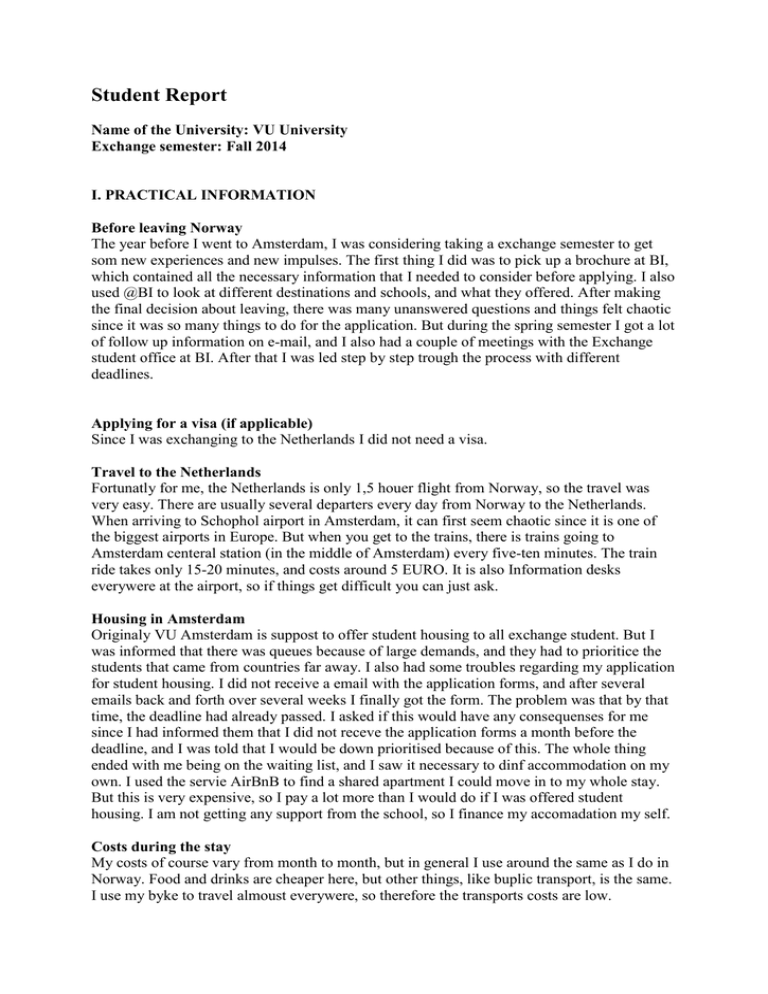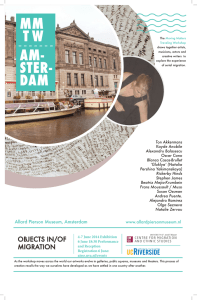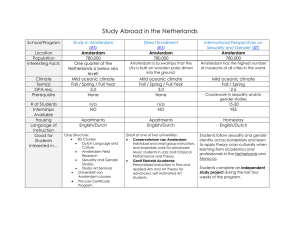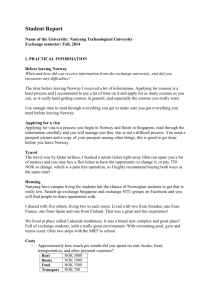Student Report
advertisement

Student Report Name of the University: VU University Exchange semester: Fall 2014 I. PRACTICAL INFORMATION Before leaving Norway The year before I went to Amsterdam, I was considering taking a exchange semester to get som new experiences and new impulses. The first thing I did was to pick up a brochure at BI, which contained all the necessary information that I needed to consider before applying. I also used @BI to look at different destinations and schools, and what they offered. After making the final decision about leaving, there was many unanswered questions and things felt chaotic since it was so many things to do for the application. But during the spring semester I got a lot of follow up information on e-mail, and I also had a couple of meetings with the Exchange student office at BI. After that I was led step by step trough the process with different deadlines. Applying for a visa (if applicable) Since I was exchanging to the Netherlands I did not need a visa. Travel to the Netherlands Fortunatly for me, the Netherlands is only 1,5 houer flight from Norway, so the travel was very easy. There are usually several departers every day from Norway to the Netherlands. When arriving to Schophol airport in Amsterdam, it can first seem chaotic since it is one of the biggest airports in Europe. But when you get to the trains, there is trains going to Amsterdam centeral station (in the middle of Amsterdam) every five-ten minutes. The train ride takes only 15-20 minutes, and costs around 5 EURO. It is also Information desks everywere at the airport, so if things get difficult you can just ask. Housing in Amsterdam Originaly VU Amsterdam is suppost to offer student housing to all exchange student. But I was informed that there was queues because of large demands, and they had to prioritice the students that came from countries far away. I also had some troubles regarding my application for student housing. I did not receive a email with the application forms, and after several emails back and forth over several weeks I finally got the form. The problem was that by that time, the deadline had already passed. I asked if this would have any consequenses for me since I had informed them that I did not receve the application forms a month before the deadline, and I was told that I would be down prioritised because of this. The whole thing ended with me being on the waiting list, and I saw it necessary to dinf accommodation on my own. I used the servie AirBnB to find a shared apartment I could move in to my whole stay. But this is very expensive, so I pay a lot more than I would do if I was offered student housing. I am not getting any support from the school, so I finance my accomadation my self. Costs during the stay My costs of course vary from month to month, but in general I use around the same as I do in Norway. Food and drinks are cheaper here, but other things, like buplic transport, is the same. I use my byke to travel almoust everywere, so therefore the transports costs are low. Rent Books Food Transport Other NOK 5000 NOK 1000 NOK 3000 NOK 100 NOK 3000 Culture and language in Amsterdam The great thing about the Netherlands is that the people here are great in speaking English. I have not yet met anyone who do not (even old people). So it is very easy to have conversations, and get any help you might need during the stay. All of the workers on the faculty (from teachers to employees in the café), and also the students are great English speakers. At the Business and Economics faculty, almoust all of the lectures and exams is in English also for the dutch students. To experience the city of Amsterdam and its culture is very easy. The city is very unique, and only a bike ride trough the city center will give you a glims of what it has to offer. In the introductions weeks all the exchange students was introduced to a service called iAmsterdam, which is a city portal where you can fint information about what to do and how to do it. It is also to recommend to get some dutch friends, to really represent the dutch culture. VU Amsterdam has an arrangement called Buddy, where you sign up and get a dutch student as your “mentor”. This is a good way to get started if you don’t have any friends from the Netherlands. II. ABOUT THE SCHOOL Vrije Universiteit is a university in Amsterdam, the Netherlands. The university is located around 20 minutes from the city center. The school is one of two universities in Amsterdam. It was founded in 1880, and has around 25.000 students and 2.250 staff members. The university contains 12 faculties; - Arts - Dentistry/ACTA - Economics and Business Administration - Eart and Life Sciences - Human Movement Sciences - Law - Medicine - Philosophy - Psychology and Education - Sciences - Social Sciences - Theology A semester consist of three periods, where you in the two first periods take two courses (6 european student points for each), and in the third period take one course. In total this will leave you with 30 student points per semester. The course I wanted to take, I signed up for before trough a link I received on my email before 1th august. This was a very easy form, and the international office at VU arranged the other things after this, like for example register for exams. This process was very easy. The add/drop period ends two weeks before a new period start, and this you will be reminded of by e-mail. Academic calendar I arrived in Amsterdam 17th august, two days after the introduction week for exchange students had started. The first week is a week full with activities both academic and social, and I recommend to participate strongly. This is a great chance to meet people in the same situations, and get new friends. Also you will get a lot of useful information regarding how to study at the VU which helps clarify things before the classes starts. The classes starts the first week of September, and the examinations is at the end of each period. The semester is finished in the end of January/start of February. Arrival The introductions weeks goes over two weeks, and has different activities as lectures, games, dinners and festivals. The goal with this is of course to gather the exchange students so they can meet other students, and learn more about how things work at the VU. I thought the introductions weeks was very helpful and I got a lot of questions answered. I also met people that I now consider my friends. The introduction weeks mostly found place at school, and in the city center. The International Office I got my first information email from the international office just after I received my acception lether. After that I regulary received useful emails trough the spring and summer before I left Norway. After arrival, the international office was part of the introduction weeks by having a presentation about who they were, where we could find them and what they could help with. They left the impression that they would like to help us with everything they can. I have visited their desck several times, with questions and papers they needed to sign. Social activities at the VU The social activities has been amazing. It is natural that you get to know a lot of exchange students from other countries, since you meet them in the introductions weeks and everyone is in the same situation. You will also get to meet dutch people when the classes start, and the courses often has assignments that you need to collaborate with other students. I know that there is different organizations that builds up on the social life at school, but I have not engaged in them since I have met so many on my own. III. ACADEMICS In the classroom The teaching style was very similar to the practice at BI. The teachers usually summarized the learning objects, and supplied examples from the real world. Every course also included several guest lectures with experts on the subjects or people from big firms. Usually there was also some mini-group assignments in each lecture where we had to sit together and solve a problem, and shortly present to the rest of the class. We also were devided in different groups where we had to prepear bigger presentations of cases. All in all I think the teching style was both practical and theoretical. The different teachers was open for questions from the students during the lectures, so it was very informal. When it comes to the level and workload it was more intence than at BI because the courses was based on periods of 1,5 months. So I really had to work hard to get things done to each class. Since the workload was pretty much the same as at BI, I had to to everything in 1,5 month instead of 5-6 months. Course materials Every course contained at least one book, and usually around 10 articles. The articles was eather posted on the student surver online or we had to find it our selves on the internet. Every teacher also made Powerpoints available before each class, which contained the main subjects we needed to learn for the exam. In some courses the level of the material was more advanced than others, but some courses also had very learning-friendly literature. Everything was in English. Exams The exams was based on both the course materials and the lectures. But since we did not have much time from the course started until the exam, the teachers gave us exam questions that they had been talking about in class. So when preparing for the exam I used the powerpoints as a basis for what I needed to know. How was the course evaluated (include all that apply)? o Final exam (written and home assignment) o Small assignments and papers o Presentations o Group work o Class attendance o Class participation Library and technology All the faculties included liberaries and study spaces on each floor, both for group work and for working alone in silence. Every floor also contained computer facilities. I had everything I needed at my faculty. Description of courses Please list below all the courses you took while on exchange. Your comments are useful for BI and for future exchange students, include information on the qacadmic level, challenges, relevance to your studies, if the course was practical/theoretical, any enrolment issues, etc. Course code & name Strategy & Environment 2.1 IBA Master/ Bachelor Bachelor Exam form Prerequisites 3- houer written multiple choise exam + an written group assignment. None Approved as Elective Comments This course could had required some previous knowledge, since the other people that Business Information Systems 2.1 IBA Bachelor 3- houer written multiple choise and open question exam + an written group assignment. None Elective Organizational Design 2.2 IBA Bachelor 3- houer written multiple choise exam + an written group assignment. None Elective Culture and Citizenship Bachelor Take at home exam over 8 days. None Elective Introduction to Environmental Sciences Bachelor 3-houer multiple choise and open questions exam, group None Elective followed the class had related courses in forhand. A theoretical course. This course was good because the teachers taught it as we did not have any previous knowledge. A theoretical course. This was the most interesting and fun course I took on my exchange, its plicable to every business no mather what they do. A theoretical course This was an interesting course, but a little outdated learning technique from the teacher- no powerpoint or activity at our sudent server. This was a very theoretical course. This was a interesting course, and also easy to presentations, group assignment, group evaluation on other students presentations and assignments. handle since it is a introductio n course. But it would be good to have some previous knowledge, since they expected us to know a lot of basics that they did not cover in class. We had a lot of miniassignment s which made it a more practical course. On a final note, how will you sum up the exchange experience? My academic experiences is that I have had a huge learning curve since it have been so intense. It also was a good practice to just focus on two courses at the time, since it gave my a deeper understanding and focus. On a more general note I now have experienced things that I will treasure for the rest of my life, I have met new friends from all over the world, and I have learned to speak and write English much better then before. In the future I think it looks great on a job application that I have been on exchange, since it says something about me as a person that I have challenged myself by traveling alone to another country. I also think by exchanging to another culture gives you an insight that makes you more reflected and interrestin as a person. I feel that by jumping on this oportunitie I have challenged my social skills in a good way. Because it is a challenge to move to another country and start over.



